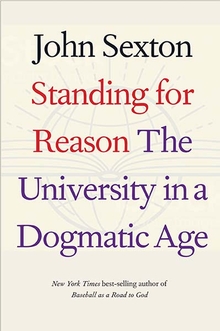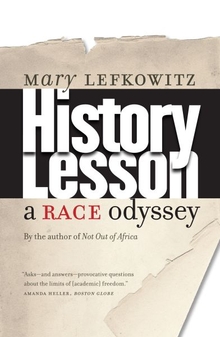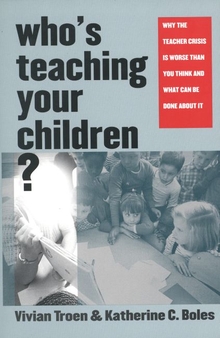Standing for Reason
WARNING
You are viewing an older version of the Yalebooks website. Please visit out new website with more updated information and a better user experience: https://www.yalebooks.com
The University in a Dogmatic Age
John Sexton; With a Foreword by Gordon Brown
A powerful case for the importance of universities as an antidote to the “secular dogmatism” that increasingly infects political discourse
John Sexton argues that over six decades, a “secular dogmatism,” impenetrable by dialogue or reason, has come to dominate political discourse in America. Political positions, elevated to the status of doctrinal truths, now simply are “revealed.” Our leaders and our citizens suffer from an allergy to nuance and complexity, and the enterprise of thought is in danger. Sexton sees our universities, the engines of knowledge and stewards of thought, as the antidote, and he describes the policies university leaders must embrace if their institutions are to serve this role. Acknowledging the reality of our increasingly interconnected world—and drawing on his experience as president of New York University when it opened campuses in Abu Dhabi and Shanghai—Sexton advocates for “global network universities” as a core aspect of a new educational landscape and as the crucial foundation-blocks of an interlocking world characterized by “secular ecumenism.”
John Sexton argues that over six decades, a “secular dogmatism,” impenetrable by dialogue or reason, has come to dominate political discourse in America. Political positions, elevated to the status of doctrinal truths, now simply are “revealed.” Our leaders and our citizens suffer from an allergy to nuance and complexity, and the enterprise of thought is in danger. Sexton sees our universities, the engines of knowledge and stewards of thought, as the antidote, and he describes the policies university leaders must embrace if their institutions are to serve this role. Acknowledging the reality of our increasingly interconnected world—and drawing on his experience as president of New York University when it opened campuses in Abu Dhabi and Shanghai—Sexton advocates for “global network universities” as a core aspect of a new educational landscape and as the crucial foundation-blocks of an interlocking world characterized by “secular ecumenism.”
John Sexton is president emeritus, dean emeritus, and Benjamin Butler Professor of Law at New York University. His previous books include the New York Times bestseller Baseball as a Road to God and Redefining the Supreme Court’s Role.
“One of the leading educators of our time provides an incisive analysis of the collapse of political discourse, and offers a path forward—with our universities charting the course to more meaningful dialogue as the antidote. The result is a book that gives us hope for the future.”—Hillary Rodham Clinton
“I did not realize how hungry I was for such unrelentingly positive witness. John Sexton’s book is a stirring corrective to the rising tide of darkness, negative energy, and even cynicism. As political America cowers before "the other," whether immigrants from abroad or persons of color long at home on these shores, this celebration of differences rings with power. John invites the reader to lift the gaze up from the clutter and discouragement of the present moment (especially here in the US) and see the shape of a possible future, one full of promise.”—James Carroll, author of Constantine’s Sword
“With this wonderful book, John Sexton offers a lifetime’s worth of wisdom and a challenge to leaders everywhere. Every page radiates with John’s humor, his decency, and his fundamental good sense. This is an urgently important book, and it could not be more timely.”—Vartan Gregorian, former President of Brown, now President of the Carnegie Foundation
“In this challenging and deeply inspiring book, John Sexton has given us a vision of the university of the future as a guardian of civil debate, nuanced complexity and global intercultural understanding in a world urgently in need of all three. A fine credo from one of the master architects of higher education in our time.”—Rabbi Lord Jonathan Sacks, former Chief Rabbi of the United Kingdom, author of The Dignity of Difference
“John Sexton has been a remarkable university president. The enlightened pages of this book are a product of his thought, experience, and, above all, his passion about the future of universities.”—Robert Berdahl, former president of the University of Texas at Austin, the University of California (Berkeley), and the Association of American Universities (53)
“Both a memoir of the heart and a call to action of the mind, Standing for Reason vividly reimagines the American university in an era of rising anti-intellectual fervor and the triumph of absolutism over thought. John Sexton, the uniquely passionate teacher who led NYU to the top ranks of the world’s universities, has delivered a must-heed lesson plan for higher education.”—Arthur Browne, Author and former Editor-in-Chief, New York Daily News
“In this remarkable book, John Sexton argues that our nation must reclaim the public purposes of higher education. In doing so, he offers a vision of excellence and inclusion that captures the essence, mission, and potential of the 21st-century university. This book provides a beautifully reasoned manifesto for the value proposition that a quality education is an investment, not an expense, one that every nation, especially America, must afford if we are to create a better world for all. John calls upon us to combat the “marginalization of seriousness” and to create a shared global commitment to educational quality for all. And he shows us how this can be done.”—Martha Kanter, CEO, College Promise Campaign, U.S. Under Secretary of Education
“At a time when higher education and its values are under attack from a broad array of critics, from right-wing legislators wielding budget axes to student activists trying to shut down speakers with opposing views, John Sexton is a sorely needed voice for the idea of liberal arts, research, and independent scholarship. Agree with him or not—and consistent with his 50-year career from high school debate coach to global university president, he makes us think—Standing for Reason could not have arrived at a more critical moment.”—Gara LaMarche, President, the Democracy Alliance
“John Sexton, one of America’s best known and most accomplished university leaders, helped transform NYU from what was 40 years ago a regional university, struggling to survive, into one of the best and most important universities in the world. In his latest book, he asks how universities can help heal the anger and polarization that have become central features of America’s civic culture, and he provides a detailed and compelling answer: Universities must recommit themselves to be centers of open, robust, and even controversial debate, and, by doing so, to foster the development of a more informed and collaborative community; they must expand their global reach, as NYU has done with its global network and its new campuses in Abu Dhabi and Shanghai; and, working with government, they must expand access to high- quality higher education for all students.
His arguments are thoughtful, carefully examined, and persuasive. If we have the energy and commitment to implement his plans, our universities will lead the way in embracing differences, dialogue, and understanding in a way that our interconnected society desperately needs.”— Ted Mitchell, President, American Council on Education
His arguments are thoughtful, carefully examined, and persuasive. If we have the energy and commitment to implement his plans, our universities will lead the way in embracing differences, dialogue, and understanding in a way that our interconnected society desperately needs.”— Ted Mitchell, President, American Council on Education
“John Sexton, who so ingeniously redefined theological saves and errors in his Baseball as a Road to God, now gives us his latest book, Standing for Reason, in which he argues convincingly that global universities are the last, best sanctuaries for civic and civil discourse and the best incubators for equal opportunity in an ecumenical world. If he can do for global education and equal opportunity what he accomplished for New York University, the world will be a better and fairer place.”—Sam Roberts, New York Times
“Standing for Reason stands for more than that: It stands for the values of an open mind, of rigorous debate, and helps define the role that colleges and universities can play in a world where knowledge is both created and destroyed with each passing day. John Sexton, in lucid prose, explores the ways the hardening dogmatism of the 21st century has led not only to the calcification of opinion, but the increasing substitution of fiction for fact. He calls this phenomenon the rise of secular dogmatism. While he skillfully diagnoses this ill, he also reminds us that the beauty of higher education is that it underpins our ability to push back against dogmatism with reason. There is, in fact, progress to be made in the world, and sustaining it is up to each of us.”—Gabrielle Starr, President, Professor of English and Neuroscience, Pomona College
“John Sexton has been teaching, and thinking about teaching, for almost 60 years; and yet he remains young – that is, passionately engaged, open-minded, and original. When he writes of the "secular dogmatism" that afflicts our age, he does so through vivid memories of his own liberation from dogma at his Jesuit high school. When he insists that it is the university's highest calling to serve as a "sacred space” for reasoned discourse, he speaks with the authority of professor, dean, and perhaps the most transformative university president of the last generation. When he lays out a vision for the "global network university" of the future, it is today’s New York University, and his own handiwork as president, that he is describing. Sexton has, in short, a hard-earned authority on the great questions of higher education that literally no one else can match.”—James Traub, Journalist (The New York Times, Foreign Policy), author of several books, most recently What Was Liberalism? The Past, Present and Future of a Noble Idea
"A forceful argument on behalf of the modern university. . . . Having established himself as a visionary when he was president of NYU, Sexton argues that a university that returns to basic principles and extends its horizons offers a remedy to the madness of our current political discourse. . . . Sexton clearly shows how less shouting and more listening can lead to a reclaiming of a lost middle ground.”—Kirkus Reviews
"The book warmly and humbly renders the turning points of his life as a way of contextualizing Sexton’s fears about our present."—New Yorker
“This book is a very positive presentation of key elements in the future of universities.” –J.T. Rosenthal, Choice
"John Sexton, recently retired president of New York University, moves beyond . . . formulaic encomia to offer a clear description of reason in action as a cure for the mindless dogmatism that infects us in the age of Twitter."—George Dennis O'Brien, Commonweal
ISBN: 9780300251869
Publication Date: April 21, 2020
Publication Date: April 21, 2020
240 pages, 5 1/2 x 8 1/4








